Parents desperate to lure youngsters away from their tablets now have bait.
Starting Monday, Taipei Children’s Arts Festival (台北兒童藝術節) will offer puppetry, theater, music, acrobatics, exhibitions, film screenings and do-it-yourself workshops until August 11.
Going kinetic
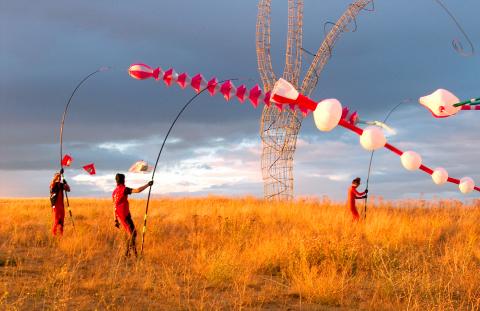
Photo Courtesy of Taipei Children’s Arts Festival
This year’s theme is “Dynamic Body, Soaring Imagination” (動力身體 運轉想像), which translates into a focus on machines. Organizers want to show children that machines aren’t just computer games and laptops.
“We hope to show that there are a lot more possibilities of technology and machine than one dominant form, and that everyday objects can come alive and become different objects with a little imagination,” Liu Li-ting (劉麗婷), the festival’s vice executive director, told the Taipei Times.
Savanna — a Possible Landscape is a theater exhibit that uses machines to enchant. Israeli artist Amit Drori and Theatre Vidy-Lausanne of Switzerland have populated a savanna scene with meticulously crafted robot animals: elephants, snakes, birds, tortoises, snails and caterpillars. The machine beasts can be controlled with a remote control device or like a puppet to make intricate movements and express “human thought and emotion,” according to Drori’s notes on the festival’s bilingual Web site.
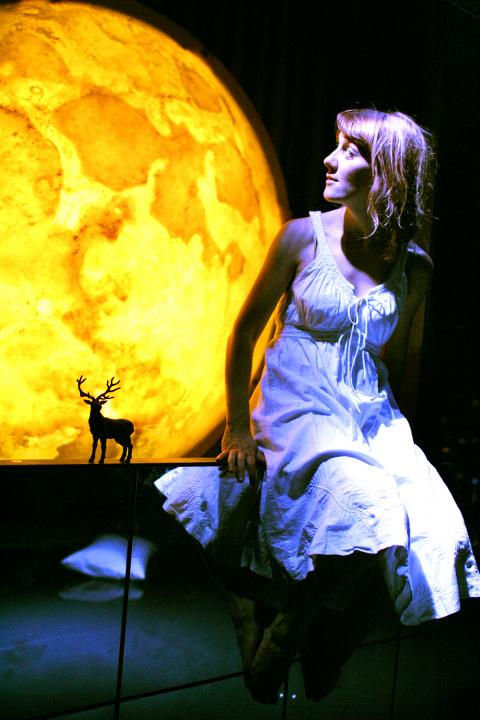
Photo Courtesy of Taipei Children’s Arts Festival
At the Bopiliao Historical Block (剝皮寮歷史街區) , an exhibition called Dynamic Tribe (動力部落) features interactive installations by five artists and groups that encourage visitors to see machines and their functions from a creative angle.
Mutienliao Interactive dot TW (木天寮互動雜工作宅) breathes new life into a recycled umbrella and turns it into a kinetic jellyfish. Noise Kitchen Workshop (噪咖事務所), a curatorial team formed by new-media artists including Wang Chung-kun and Huang Wen-hao (黃文浩), is at the festival with a singing cabinet. Visitors are invited to make music by opening and closing the cabinet’s drawers, each of which contain a device that plays a musical note when activated. On the other side of the exhibition, co-curator Cheng Hung-chi (鄭鴻旗) teams up with OpenLab.Taipei to offer 108 small robots that come in different shapes and perform different functions.
Community effort
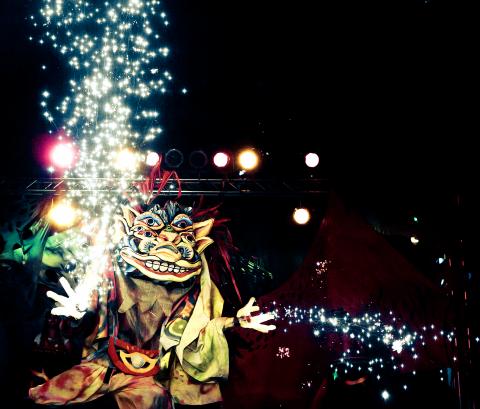
Photo Courtesy of Taipei Children’s Arts Festival
In its 14th incarnation, the festival is a must-see event for families with children, and its paid international performances always sell out early.
For those who fail to get a hold of tickets, don’t despair: Event organizers have also put together an extensive program of free community performances and outdoor events that take place at various community centers, parks and schools across the city.
“The idea is to allow people, no matter which part of the city they live in, to see our shows easily at venues close by. But if they are willing, festival-goers can also venture into different areas to see a performance and explore a place they wouldn’t otherwise have visited,” Liu said, adding that there are a great variety of shows because organizers want to expose children to diverse forms of art.
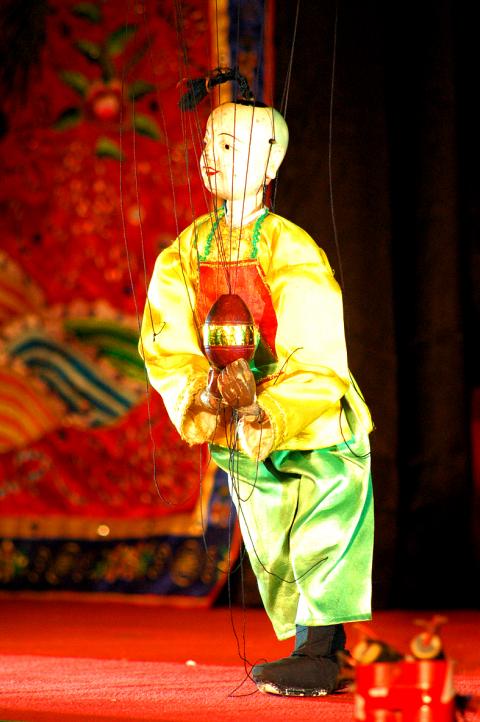
Photo Courtesy of Taipei Children’s Arts Festival
The performance lineup for the community events includes many of Taiwan’s top children’s theater groups such as Puppet Beings Theatre Company (偶偶偶劇團) and Comma Theatre Company (逗點創意劇團). Chinese operatic art is demonstrated by the Chinese Opera Department at National Taiwan College of Performing Arts, while Capital Ballet Taipei (台北首督芭蕾舞團) introduces young audiences to various ballet choreographies.
The richest visual feast, however, is A-TA-KA, produced by Cal y Canto Teatro from Spain. Noted for using large kites in the shapes of animals, the company will stage a colorful parade in the sky that is remarkably in sync.
Other outdoor performances include a concert by award-winning Aboriginal a appella group O-Kai Singers (歐開合唱團), Shiukim Taiwanese Opera Troupe’s (秀琴歌劇團) operatic rendition of the Monkey King (孫悟空) and Sun Son Theatre’s (身聲劇場) The Wings of Hope (希望之翼), which combines live music, puppetry, masks and theater to tell the story of a lost dream.
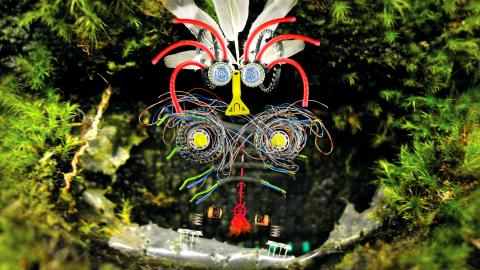
Photo Courtesy of Taipei Children’s Arts Festival
Detailed information about the festival can be found at www.taipeicaf.org

“How China Threatens to Force Taiwan Into a Total Blackout” screamed a Wall Street Journal (WSJ) headline last week, yet another of the endless clickbait examples of the energy threat via blockade that doesn’t exist. Since the headline is recycled, I will recycle the rebuttal: once industrial power demand collapses (there’s a blockade so trade is gone, remember?) “a handful of shops and factories could run for months on coal and renewables, as Ko Yun-ling (柯昀伶) and Chao Chia-wei (趙家緯) pointed out in a piece at Taiwan Insight earlier this year.” Sadly, the existence of these facts will not stop the

Taiwan is one of the world’s greatest per-capita consumers of seafood. Whereas the average human is thought to eat around 20kg of seafood per year, each Taiwanese gets through 27kg to 35kg of ocean delicacies annually, depending on which source you find most credible. Given the ubiquity of dishes like oyster omelet (蚵仔煎) and milkfish soup (虱目魚湯), the higher estimate may well be correct. By global standards, let alone local consumption patterns, I’m not much of a seafood fan. It’s not just a matter of taste, although that’s part of it. What I’ve read about the environmental impact of the

It is jarring how differently Taiwan’s politics is portrayed in the international press compared to the local Chinese-language press. Viewed from abroad, Taiwan is seen as a geopolitical hotspot, or “The Most Dangerous Place on Earth,” as the Economist once blazoned across their cover. Meanwhile, tasked with facing down those existential threats, Taiwan’s leaders are dying their hair pink. These include former president Tsai Ing-wen (蔡英文), Vice President Hsiao Bi-khim (蕭美琴) and Kaohsiung Mayor Chen Chi-mai (陳其邁), among others. They are demonstrating what big fans they are of South Korean K-pop sensations Blackpink ahead of their concerts this weekend in Kaohsiung.

The captain of the giant Royal Navy battleship called his officers together to give them a first morsel of one of World War II’s most closely guarded secrets: Prepare yourselves, he said, for “an extremely important task.” “Speculations abound,” one of the officers wrote in his diary that day — June 2, 1944. “Some say a second front, some say we are to escort the Soviets, or doing something else around Iceland. No one is allowed ashore.” The secret was D-Day — the June 6, 1944, invasion of Nazi-occupied France with the world’s largest-ever sea, land and air armada. It punctured Adolf